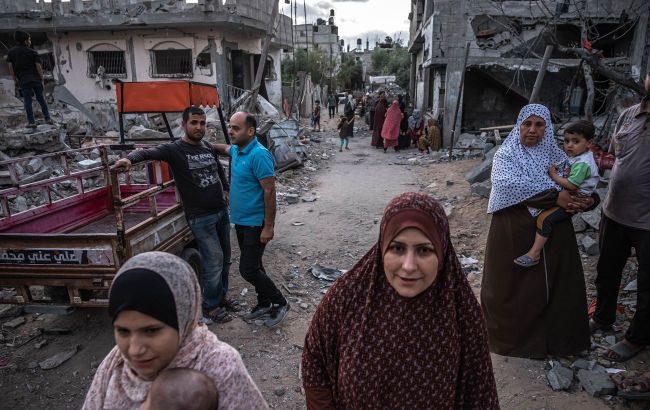Nearly two months without food aid: AP investigates how Palestinians survive in Gaza
 Photo: Food supplies are gradually disappearing in Gaza (Getty Images)
Photo: Food supplies are gradually disappearing in Gaza (Getty Images)
In the Gaza Strip, which is blocked by Israel, no food, fuel, medicine, or other goods have been delivered for almost 60 days, the Associated Press (AP) reports.
According to the media resource, humanitarian groups are running out of food for distribution, and the markets are almost empty. As a result, Palestinian families are struggling to feed their children.
About 2.3 million Palestinians in Gaza are now mainly surviving on canned vegetables, rice, pasta, and lentils. Meat, milk, cheese, and fruits have disappeared. Bread and eggs have become scarce. At the same time, the few vegetables and other products available in the market have skyrocketed in price, becoming unaffordable for most.
"We can't get anything that provides any protein or nutrients," said Mariam al-Najjar, a local resident of Khan Younis.
According to Mariam al-Najjar, food supplies are disappearing gradually. When meat became scarce, she bought canned sardines, but those are no longer available either. Previously, the family received packages of milk from the UN, but they ran out a few weeks ago. Once a week, she used to buy tomatoes to make a salad for her children, but now she can't even afford that.
Now the family has switched to eating canned beans or peas and carrots. When they cannot find those, they rely on lentils or pasta from a charity kitchen. If al-Najjar finds bread or sugar, she gives her children bread soaked in tea to stave off hunger.
Doctors warn that the lack of variety, protein, and other nutrients in children's diets will cause long-term harm to their health.
"Children need the food pyramid for their development," Dr Ayman Abu Teir, Head of the Therapeutic Feeding department at Khan Younis' Nasser Hospital said: meat, eggs, fish and dairy for their growth, fruits and vegetables to build their immune systems. "These do not exist in Gaza," he said
What precedes
Israel imposed a blockade on Gaza on March 2, after which, on March 18, it violated a two-month ceasefire and resumed military actions. The country stated that both steps were aimed at pressuring Hamas to release hostages. During the truce, the sides exchanged hostages, but soon after, Hamas stopped releasing them and was breaking the agreement. The group warned that if this continued, the ceasefire could end.
As for the blockade, AP writes that human rights organizations call it a "starvation tactic" that puts the entire population at risk and constitutes a war crime.
Israel had earlier stated that there was enough aid in Gaza after a sharp increase in its distribution during the ceasefire. The country accuses Hamas of redirecting the aid for its own purposes.
For their part, humanitarian workers deny that there is significant redirection, stating that the UN strictly monitors the distribution.
Earlier, RBC-Ukraine reported that Egypt and Qatar, who are mediators in the negotiations between Israel and Hamas regarding a ceasefire and the release of hostages, made a new proposal to the parties. The agreement means a ceasefire lasting 5–7 years.

